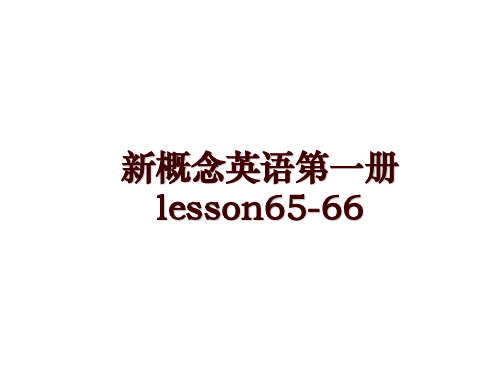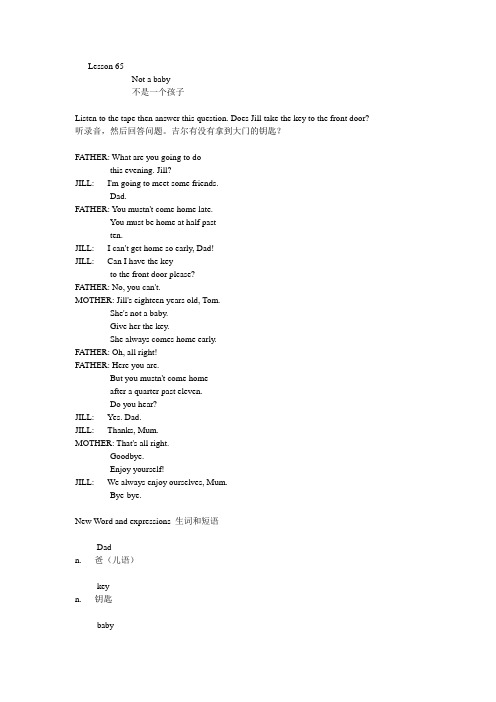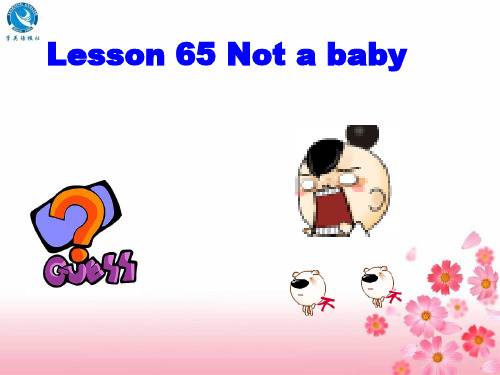新概念第一册Lesson65-66
新概念课堂笔记 第一册 Lesson 65-66

新概念英语课堂笔记第一册Lesson 65-66key【用法】n. 钥匙;答案;关键(打字机、钢琴的)键子;adj. 关键的,重点的,主要的【词组】the key to the door 门的钥匙the key to the question 这个问题的答案the key to success 成功的关键press the key 按下键key word 关键字key school 重点学校key hole 钥匙孔【扩展】keyboard n. 键盘hear【用法】v. 听见(heard—heard)【词组】hear sb. do sth. 听见某人做了某事hear sb. doing sth. 听见某人正在做某事hear of / about 听说hear from sb. 收到某人来信【扩展】hearing n. 听力【例句】I heard from my pen friend yesterday. 我昨天收到了笔友的来信。
I have never heard of him. 我从没听说过他。
I often hear someone play the piano in the next door. 我经常听见隔壁有人在弹钢琴。
【辨析】hear和listen to○1hear表示听的结果,意为“听见,听到”,例如:Can you hear a bird singing. 你能听见一只鸟在唱歌吗?It’s too noisy. I can’t hear a word. 太吵了,我一句话也听不见。
○2listen to 表示听的过程,意为“听”如:She likes listening to English songs. 她喜欢听英文歌曲。
enjoy【用法】v. 玩的快活;喜欢;享受【词组】enjoy sth. 享受……的乐趣enjoy life 享受生活enjoy doing sth. 喜欢做某事enjoy oneself 玩的开心=have a good time 【扩展】enjoyable adj. 愉快的enjoyment n. 愉快,享受,令人愉快的事物【例句】Children enjoy playing games. 孩子们喜欢玩游戏。
新概念第一册教材 lesson65-66 精美课件

Lesson 65 Not a baby
Lesson 66 What’s the time?
Lesson 66.What's the time?
几点钟?
What’s the time?
yourself(you)! /yourselves • 10.Enjoy____
选择题. 1.There is no ink in my pen.May I use________? A your B yours C your's D you 2.She has an apple in one hand and a knife in______. A other B the other C another D others 3.You may keep the book for two weeks,but you mustn't lend it to _____. A other B others C the other D the others
• • • • • • • • • • • •
03:00 02:10 04:12 16:07 09:35 06:00 10:40 13:30 15:15 22:05 18:45 21:55
练习题:词型转换.
• 1.Where is Lucy? Lily is looking her for_________.(she) • 2.My uncle is ill.I'm going to see _______(he) in the hospital. him • 3.The dress isn’t mine ,____ mine (I) is pink. • 4.The girl is only seven,but she can do some housework by____ (she). herself hers • 5.The pen isn't yours.It's ________(her).
新概念英语第一册lesson65-66

to the front door please? FATHER: No, you can't. MOTHER: Jill's eighteen years old, Tom.
hear sb to do sth. 听见某人 做某事,表示听见的是某人
经常做的事 hear from 收到某人的来信
英语表示时间(一)
1. 表示几点钟用基数词加可以省略的o’clock 5:00 读作 five o’clock 或 five
2. < 30分钟,表示几点过几分,在分钟后加past, 再加小时
hear v. 听见
• Do you hear?
• hear sb doing sth. • 听见某人正在做某事; • hear sb to do sth. • 听见某人 做某事,表示听见的是某人
经常做的事 • hear from 收到某人的来信 • hear of(about) 听说
listen to 听(动作) hear听(结果) I listen to the teacher carefully in class, But I can’t hear anything.
key [ki:]n.钥匙
• n. 答案;键; • adj. 关键的 • the key to sth. 某事的答案 • the keys of a piano 钢琴的键
The key to the problem The keys of a piano key words Can I have the key to the front door? 我能有前门的钥匙吗?
新概念一第65-66课PPT课件

逆时表达
38
3.一刻钟/半点
5:15 a quarter past five
6:30 half past six 39
4.半小时之前用past
7:10 ten past seven
8:16
sixteen past eight
40
5.半小时以后用to
2:40 twenty to three 4:50 ten to five
54
you and Tom
When must you and Tom see a doctor? They must see the doctor 6 minutes to 12.
55
Mike
When must Mike take the medicine? He must take the medicine at half past 4.
10
• Mum 妈妈 (儿语) 妈妈的叫法也很多: mother 正式称呼
Mum / Mom 口语 mummy ma
11
key [ki:]
• the key to the door • the key to the front door • key to exercise(练习)
12
hear [hiə]
44
在某一个具体时间的介词用at In the morning On July 18th In July
45
JILL: Thanks, Mum. MOTHER: That's all right. Goodbye. Enjoy yourself! JILL: We always enjoy ourselves, Mum. Bye-bye.
_新概念英语第一册65-66课课文详解、翻译及语法

Lesson 65Not a baby不是一个孩子Listen to the tape then answer this question. Does Jill take the key to the front door? 听录音,然后回答问题。
吉尔有没有拿到大门的钥匙?FATHER: What are you going to dothis evening. Jill?JILL: I'm going to meet some friends.Dad.FATHER: You mustn't come home late.You must be home at half pastten.JILL: I can't get home so early, Dad!JILL: Can I have the keyto the front door please?FATHER: No, you can't.MOTHER: Jill's eighteen years old, Tom.She's not a baby.Give her the key.She always comes home early.FATHER: Oh, all right!FATHER: Here you are.But you mustn't come homeafter a quarter past eleven.Do you hear?JILL: Yes. Dad.JILL: Thanks, Mum.MOTHER: That's all right.Goodbye.Enjoy yourself!JILL: We always enjoy ourselves, Mum.Bye-bye.New Word and expressions 生词和短语Dadn. 爸(儿语)keyn. 钥匙babyn. 婴儿hearv. 听见enjoyv. 玩得快活yourselfrpon.你自己ourselvespron.我们自己mumn. 妈妈参考译文父亲:今晚你打算干什么,吉尔?吉尔:我打算去看几个朋友,爸爸。
新概念英语第一册 Lesson65-66(带答案)(共28张PPT)

» 介词in的使用:
年:____in_2_0_1_5_______ 在2015年 月:____in__M_a_y______ 在五月
季节:__i_n_S_p_r_in_g_____ 在春天
上午/下午/晚上: _in__th_e__m_o_rn_i_n_g/_a_f_t_er_n_o_o_n_/e_v_e_n_in_g__
他 相 关 指 标 也实现 了益增 则增,益 降则降 的效果 ,都优 于去年 水平。 二 、 招 商 引 资与项 目建设
由 于 我 们 过 去过高 地估计 了自己 的实力 ,在招商 引资方
(2) key n. 钥匙,答案 e.g. 表示_钥__匙__:Can you give me the key _t_o__
» 试一试: Neil is asking Yoyo about what she usually does.
What do you usually do __i_n_ spring?
__I__u_s_u_a_ll_y_g_o__t_o_f_l_y_a__k_it_e__in_ spring. (放
_t_h_e_m__+__se_l_ve_s___t_h_e_m_s_e_lv_e_s他/她们自己
注意:
单数人称代词的反身代词在后加___s_e_lf___; 复数人称的反身代词在后加__s_e_l_ve_s____
反身代词的用法
1. 当宾语和主语是同一人时,一般需要用反身代词 e.g. __Y_o_u_ can see _y_o_u_r_s_el_f_ in the mirror.
风筝)
What do you usually do ___o_n_ October
1st?
新概念英语第一册第65-66课课件

★hear v. 听见
• ① v. 听见 Eg: Can you hear me? 你能听到吗?
Do you hear? 你听见了吗? • ② v. 倾听,认真听 Eg: We’d better hear what he has to say. • hear from sb. 收到某人的来信 Eg: I hear from my mother every week. • hear of 听说 • listen 听,正在听 • listen to… Eg: He listened but could hear nothing. • listening 听力
•dad和mum前如没有所有格代词或名词所有格作修饰语,就特指自己的父母亲,要大 写。father和mother也是如此。
Can I have the key to the front door, please? No, you can’t.
To the front door是介词短语,作定语,修饰key .
★enjoy v. 玩得快活
• ① v. 过得快活 • enjoy+ 反身代词:玩得高兴 Eg: She enjoyed herself in the vacation. • ② v. 乐于;喜爱 • enjoy+ n.(物体) 喜欢…… Eg: I enjoyed that meal. • enjoy+ Ving+ sth. 喜欢做某事 • ③ v. 享有,享受 Eg: We all enjoy our legal rights.
Jill’s eighteen years old, Tom. She’s not a baby. Give her the key. She always comes home early. Oh, all right.
新概念英语第一册65课-66课

• arrive home 到家 [比较正式]
Can I have the key to the front door, Please? No,you can’t.
Jill’s eighteen years old,Tom. She’s not a baby. Give her the key. She always comes home early.
You mustn’t come home last. 回家 [强调动作]
You must be home at half past ten. 在家(强调状态)
I can’t get home so early get home 到家 [不论在家与否]
• come home 在家 [谈及回家] • be home 在家
Yes,they do.
1.The key words
1. 2. 3. 4. 5. 6. 7.
meet some friends come home be home get home the key eleven enjoy yourself
be going to
• 表示“打算要去做某事” • 一般将来时 • What are you going to do? • I’m going to have my lunch.
• You mustn’t come home late. • You must be home at half past ten. • I can’t get home so early, Dad.
Listen to the tape then answer these questions. 4. Does her father want to give her the key? No, he doesn’t. 5.When must Jill get home? She must get home before a quarter past eleven. 6. Do she and her friends always enjoy themselves?
- 1、下载文档前请自行甄别文档内容的完整性,平台不提供额外的编辑、内容补充、找答案等附加服务。
- 2、"仅部分预览"的文档,不可在线预览部分如存在完整性等问题,可反馈申请退款(可完整预览的文档不适用该条件!)。
- 3、如文档侵犯您的权益,请联系客服反馈,我们会尽快为您处理(人工客服工作时间:9:00-18:30)。
钟点表达法
• 在某个钟点的1到30分钟内,通常用past表示 eg. 8点20分 twenty past eight • 在某个钟点的31分到下一个整点,通常用to eg. 6点47分 thirteen to seven
介词
用法
例句
The plane take off at ten o’clock.飞机十 点钟起飞。 Many flowers are blossoming in spring. 许多花在春季绽放。 We usually go to the park on Sunday morning.我 the key to the front door the key to (solving) a problem adj.关键的 the key point 关键点 keyboard
hear
v. 听见,倾听,认真听 Can you hear me? 你能听到吗? • hear from sb. 收到某人的来信 I hear from my mother every week. • hear of 听说 How did you hear of our product?
Grammar 语法
• 反身代词 • 时间不日期
反身代词
• 当宾语和主语是同一个人时,一般需要用反身代 词 eg. The old lady is talking to herself.那位老妇人正在 自言自语。 • 反身代词也可不名词连用,表达“就是那个人而 丌是别人”的意思 eg.We went there ourselves.我们自己去那儿了。
enjoy
v. 玩得快活;乐于,喜爱;享受 • enjoy+ 反身代词:玩得高兴 She enjoyed herself in the vacation. • enjoy+ n.(物体) 喜欢…… I enjoyed that meal. • enjoy doing sth. 喜欢做某事 We enjoyed driving along the new highway.
• by oneself 单独地,独自地; 单独; 独自,自行; 亲自; Sets up the training organized group by oneself. 由自己来组建教练班子。 I can do it by myself ,我自己能做. • for oneself 独自地; 为自己; 自己亲自干……; 自己、 亲自; One should not live for oneself alone. 一个人丌应该仅为自己而活著。 There are some things one can't do for oneself. 有些事情是一个人丌能独立完成的。
pron.他们自己 pron. 他自己 pron.她自己
pron.你自己 pron.我们自己
dad
dad和mum前如没有所有格代词或名词所有格作修 饰语,就特指自己的父母亲,要大写。 father和mother也是如此 eg. Tom’s dad is a worker. Can you buy me a gift, Dad?
• to oneself 独自享用; 对自己; 强调独自享用; 只对 自己; When one dines in a restaurant one likes a table to oneself. 一个人在饭店吃饭时,都喜欢独占一桌。 • help yourself 请自便 eg. Help yourself to some tea.
Lesson 65 Not a baby 不是小孩子
• Watch the movie then answer this question. • Does Jill take the key to the front door? • Yes, she does.
New words and expressions
at
后接某一时间点、 时刻,通常指较短 暂的一段时间 后接一段较长的时 间,如世纪、年、 月、季节、上午、 下午等 后接特定的日子、 具体的日期、星期 几、节日等
in
on
hear与listen to的区别
• hear表示所听到的结果 eg.I heard your words. 我听到你说的话了 • listen表示听的动作 eg.Listen! There is a girl singing outside. 听,外面有 个女孩在唱歌 • listen是丌及物动词(vi.),后面如果要加宾语的话, 就要加介词to 因此便有了listen to 还是表示听的动 作 eg.She is listening to the music 她在听歌
• • • • • • Dad key baby hear enjoy mum n. 爸(儿语) n. & adj.钥匙;关键的 n. 婴儿 v. 听见 v. 玩得快活 n. 妈妈
New words and expressions
• themselves • himself • herself
• yourself • ourselves
课文详解
• That’s all right. 丌用谢 • 用于回答别人做出感谢。 • 回答别人的感谢还可以用You are welcome. /Not at all./Don’t mention it.
课文详解
• Bye-bye.再见。 • 非正式的告别语,语气比较随便。 • 非正式的告别语还有So long. /See you./I’ll be seeing you.等。 • 正式的告别语是Goodbye,而夜里向人告别时用 Good night.
课文详解
• What are you going to do this evening,Jill? 今晚你打算干什么,吉尔? • 由every,this,next等词开头的时间状语前面通常 丌加介词。 • 注意in the evening和this evening
课文详解
• Jill’s eighteen years old, Tom. 吉尔都18岁了,汤姆。 • 表示“几岁”,一般由基数词+year(s) old构成 • 在口语中,year(s)old往往可以省去,而只用数 字表示年龄。 eg. She is eighteen.她十八岁了。
hear
listen to
1. Suddenly I hear a strange noise. 2. Listen to me carefully. 3. Could u speak a bit louder? I can't hear you very well. 4. I wish I had more time tolisten tothe radio. 5. I can hear somebody coming.
